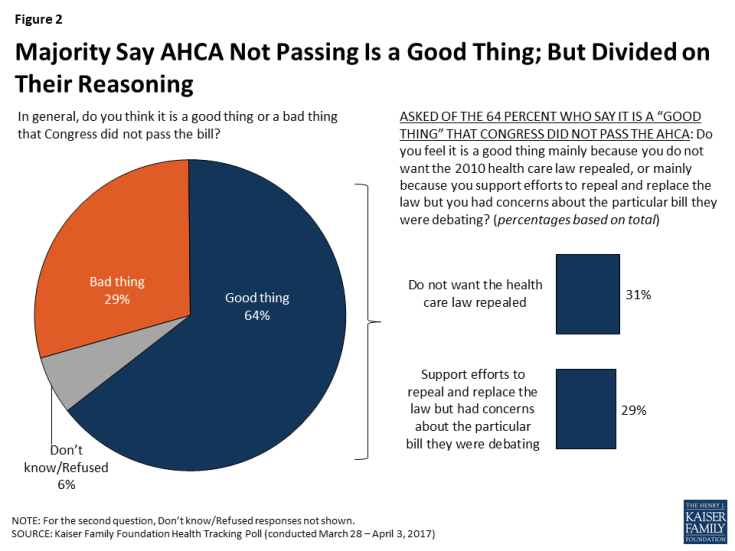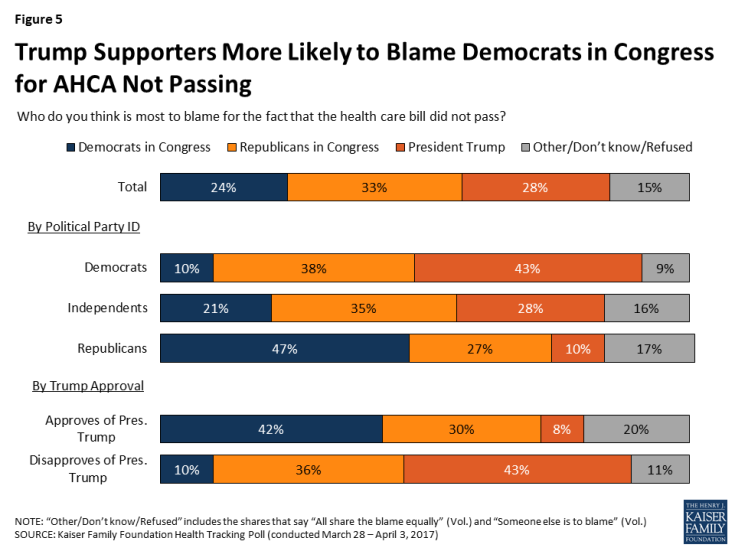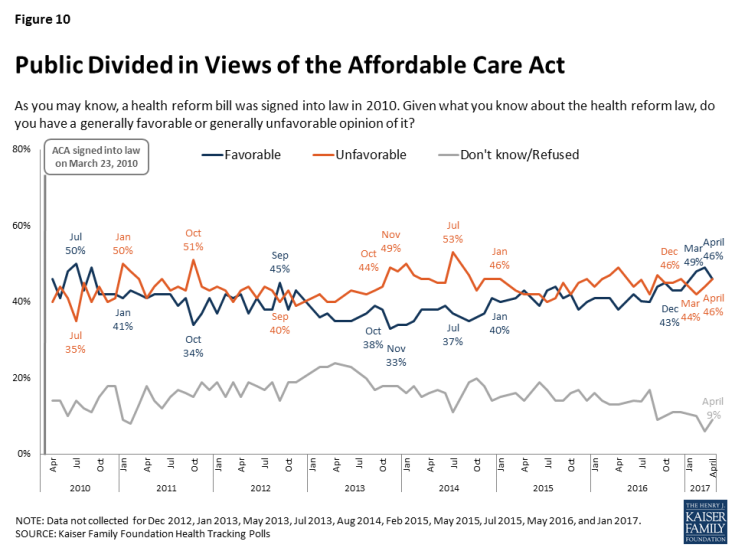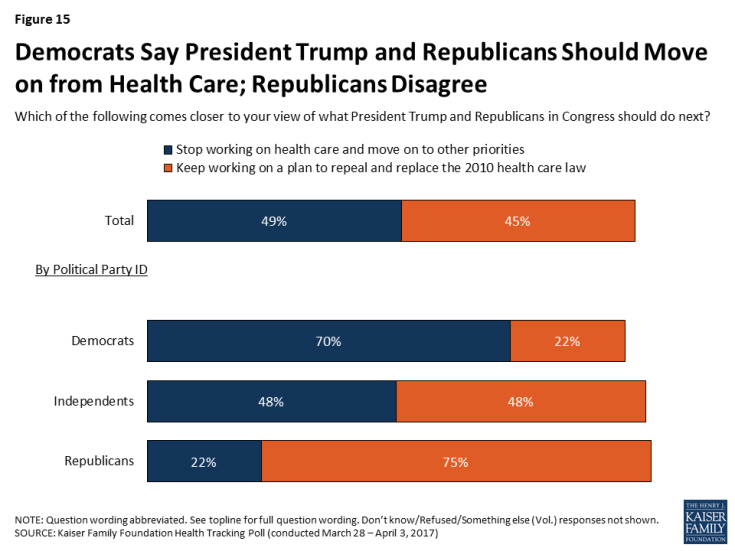Kaiser Health Tracking Poll - April 2017: The Fall of the AHCA and Next Steps for the ACA
KEY FINDINGS:
- The latest Kaiser Health Tracking Poll, conducted the week after House Republicans pulled the American Health Care Act (AHCA) from a vote, finds about two-thirds of the public (64 percent) says it is a “good thing” that Congress did not pass the bill. Majorities of Democrats (87 percent) and independents (63 percent) say it is a “good thing” the bill didn’t pass, compared to about half of Republicans (54 percent) who view it as a “bad thing.” For those who say Congress not passing the bill is a good thing, similar shares feel this way because they do not want the 2010 health care law repealed (31 percent, overall) as feel this way because while they support repeal efforts they had concerns about the AHCA (29 percent, overall).
- The public spreads blame for the bill not passing across the board, with one-third saying Republicans in Congress are most to blame, along with about three in ten who say President Trump (28 percent) and about one-fourth who say Democrats in Congress (24 percent) are most to blame. When asked specifically about Republicans in Congress, the public spreads blame about equally across House Speaker Paul Ryan (27 percent) and the conservative Freedom Caucus (27 percent), with slightly fewer blaming moderate Republicans (22 percent). While about half of the public (55 percent) say the AHCA did not pass because it went too far in cutting existing programs, views vary by party, with majorities of Democrats (74 percent) and independents (57 percent) saying it didn’t pass because it went too far in cutting existing programs, compared to six in ten Republicans (58 percent) who say the AHCA did not pass mainly because it didn’t go far enough to end Obamacare.
- Despite divided views towards the 2010 health law, three-fourths of the public think President Trump and his administration should do what they can to make the current health care law work – including a majority of Democrats and independents and half (51 percent) of Republicans. Large shares of Democrats (80 percent) and independents (65 percent), and one-third of Republicans (34 percent), also say that because President Trump and Republicans in Congress are in control of the government, they are now responsible for any problems with the ACA moving forward.
- In addition, the public is increasingly wary of President Trump’s ability to deliver on his campaign promise of less expensive and better health care for all Americans – 37 percent say they are confident that President Trump will be able to deliver on this campaign promise, down from 47 percent three months ago.
- There are divides among Republicans on who they blame for Congress not passing the AHCA as well as the next steps for President Trump and his administration. Compared to moderate and liberal Republicans, conservative Republicans are slightly more likely to place the blame for the AHCA not passing on House Speaker Paul Ryan and to say President Trump’s administration should do what they can to make the current health care law fail so they can replace it later.
The American Health Care Act
On March 6, 2017, House Republicans announced their plan to replace the Affordable Care Act (ACA) with the American Health Care Act (AHCA). Less than three weeks later, on March 24, House Speaker Paul Ryan pulled the bill from the floor before a vote took place because it did not have enough votes to pass. The most recent Kaiser Health Tracking Poll – fielded the week after the bill was pulled – finds most of the public (64 percent) says it is a “good thing” that Congress did not pass the AHCA, while about three in ten (29 percent) say this is a “bad thing.” However, views vary considerably by party with a majority of Democrats (87 percent) and independents (63 percent) saying it is a “good thing” that Congress did not pass the bill compared to about half (54 percent) of Republicans who say it is a “bad thing” that Congress did not pass the bill.
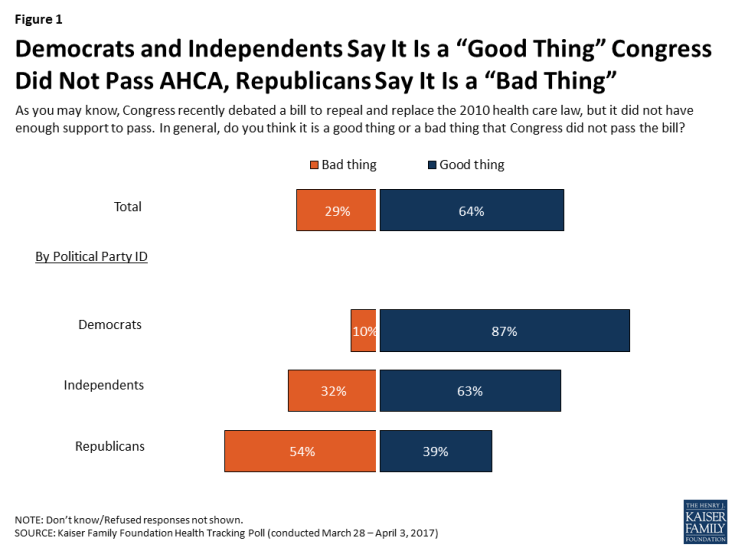
Figure 1: Democrats and Independents Say It Is a “Good Thing” Congress Did Not Pass AHCA, Republicans Say It Is a “Bad Thing”
Those who view Congress not passing the AHCA as a good thing are divided on why they feel that way, with about half saying they feel this way because they do not want the 2010 health care law repealed (31 percent of the public overall) and the other half (29 percent of the public overall) saying they feel it is a good thing because they had specific concerns about the AHCA even though they generally support repealing and replacing the ACA.
Most Democrats (59 percent) feel it is a good thing that Congress did not pass the AHCA because they do not want the 2010 health care law repealed. And, while most Republicans say it was a bad thing the law did not pass, most of the Republicans who say it was a good thing say they feel that way because they had concerns about the AHCA (33 percent of Republicans overall) as opposed to saying they feel this way because they do not want the ACA repealed (4 percent). Independents are more divided on why they think the law not passing is a good thing, but tilt somewhat more toward having concerns about this particular bill than because they would rather not see the ACA repealed (32 percent versus 26 percent).
| Table 1: Partisan Attitudes on Congress Not Passing the AHCA | ||||
| Percent who say the following: | Total | Democrats | Independents | Republicans |
| It is a good thing Congress did not pass the bill… | 64% | 87% | 63% | 39% |
| …because they do not want the 2010 health care law repealed | 31 | 59 | 26 | 4 |
| …because while they support efforts to repeal and replace the law, they had concerns about the particular bill they were debating | 29 | 23 | 32 | 33 |
| It is a bad thing that Congress did not pass the bill | 29 | 10 | 32 | 54 |
| Note: Question wording abbreviated. See topline for full question wording. Don’t know/Refused responses not shown. | ||||
Half of the Public is Relieved Congress Did Not Pass the AHCA
More Americans say they are “relieved” (52 percent) that Congress did not pass a bill to repeal and replace Obamacare than say they are “happy” (44 percent), “disappointed” (40 percent), or “angry” (20 percent).
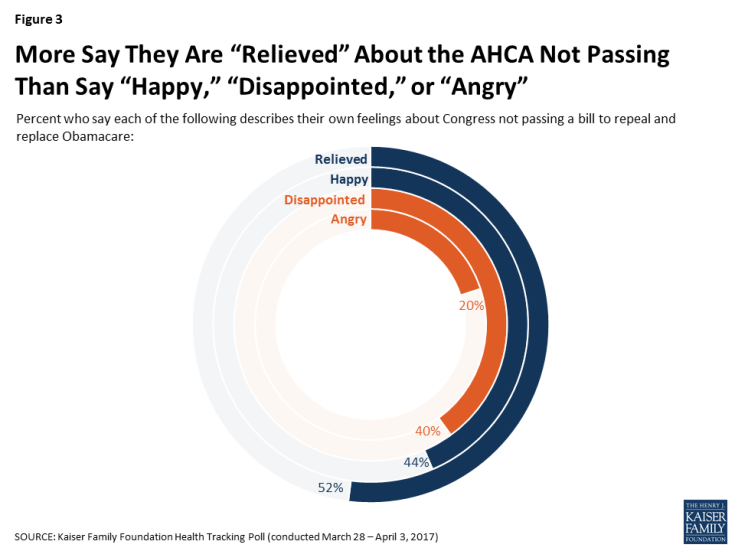
Figure 3: More Say They Are “Relieved” About the AHCA Not Passing Than Say “Happy,” “Disappointed,” or “Angry”
Seven in ten Republicans (68 percent) say they feel “disappointed” that Congress did not pass a bill repealing and replacing Obamacare. Democrats, on the other hand, are more likely to say they feel “relieved” (78 percent) and “happy” (70 percent) that Congress did not pass the bill.
| Table 2: Republicans Feel Disappointed About Congress Not Passing AHCA; Democrats Feel Relieved | ||||
|
Percent who say they feel the following about Congress not passing a bill to repeal and replace Obamacare: |
Total | Democrats | Independents | Republicans |
| Relieved | 52% | 78% | 48% | 27% |
| Happy | 44 | 70 | 41 | 18 |
| Disappointed | 40 | 20 | 41 | 68 |
| Angry | 20 | 13 | 21 | 29 |
Why Didn’t The AHCA Pass and Who’s To Blame?
When asked why the bill aimed at repealing and replacing the 2010 health care law (known commonly as Obamacare) did not pass, more say they think it did not pass mainly because it went too far in cutting existing programs (55 percent) than say it was mainly because the replacement bill did not go far enough to end Obamacare (35 percent). Not surprisingly, views vary by party, with three-fourths of Democrats (74 percent) and six in ten independents (57 percent) saying it didn’t pass because it went too far in cutting existing programs, compared to a majority of Republicans (58 percent) who say the AHCA did not pass mainly because it didn’t go far enough to end Obamacare.
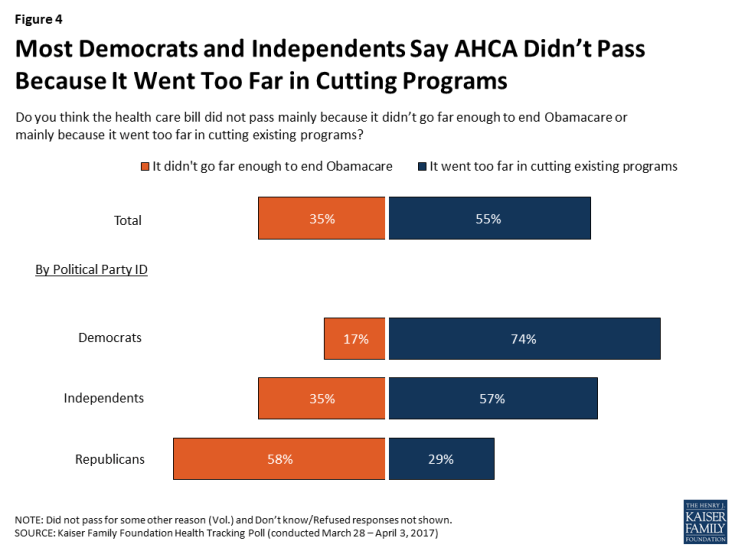
Figure 4: Most Democrats and Independents Say AHCA Didn’t Pass Because It Went Too Far in Cutting Programs
Public Points to Several Factors Playing A Role in Congress Not Passing The AHCA
The public sees a number of issues as factors in why Congress was unable to pass the AHCA. About half say lack of support from Democrats in Congress (55 percent) and lack of support from Republicans in the conservative House Freedom Caucus (53 percent) were major factors in the bill not passing, which is just slightly more than the share who say lack of support from moderate Republicans in Congress (47 percent) and lack of leadership from President Trump (47 percent) were major factors. About four in ten say lack of support from doctors, hospitals, and other interest groups (43 percent), lack of leadership from Republican House Speaker Paul Ryan (41 percent), and town hall protestors (37 percent) were major factors in Congress’ inability to pass the bill. Democrats and Republicans have differing views on what the major factors were in the House not passing the bill. For example, three-fourths of Republicans say lack of support from Democrats in Congress was a major factor in the bill not passing, while seven in ten Democrats (71 percent) say lack of leadership from President Trump was a major factor, something only 14 percent of Republicans say.
| Table 3: Public Perceives Many Factors Playing a Role in Congress’ Inability to Pass the AHCA | ||||
| Percent who say each of the following is a major factor in Congress being unable to pass the AHCA: | Total | Democrats | Independents | Republicans |
| Lack of support from Democrats in Congress | 55% | 45% | 50% | 75% |
| Lack of support from Republicans in the conservative House Freedom Caucus | 53 | 58 | 55 | 45 |
| Lack of support from moderate Republicans in Congress | 47 | 54 | 47 | 36 |
| Lack of leadership from President Trump | 47 | 71 | 47 | 14 |
| Lack of support from doctors, hospitals, and other interest groups | 43 | 50 | 49 | 28 |
| Lack of leadership from Republican House Speaker Paul Ryan | 41 | 52 | 37 | 29 |
| Protestors at town hall meetings who were upset about the bill’s potential effects | 37 | 49 | 39 | 20 |
Partisans Blame Opposing Party for the AHCA Not Passing
The public is fairly divided on who is most to blame for the fact that the AHCA did not pass. One-third say Republicans in Congress are most to blame for the AHCA not passing along with about three in ten who say President Trump (28 percent) and one-fourth who say Democrats in Congress (24 percent) are most to blame. There are stark partisan differences contributing to this divide, with about half of Republicans (47 percent) and four in ten of President Trump’s supporters (42 percent) placing most of the blame on Democrats in Congress. On the other hand, among Democrats and those who disapprove of President Trump, about four in ten place the blame on President Trump (43 percent each) and on Republicans in Congress (38 percent and 36 percent, respectively). Independents are more likely to place the blame on Republicans in Congress (35 percent) than on Democrats in Congress (21 percent).
The public is roughly divided about whether the bill did not pass due to in-fighting within the Republican party or due to disagreements between Democrats and Republicans (49 percent versus 45 percent). Republicans are more likely to say it was due to disagreements between Republicans and Democrats than to say it was due to conflict within the Republican party (61 percent versus 35 percent), while Democrats are more likely to say it was because of Republican in-fighting rather than partisan arguments (63 percent versus 32 percent).
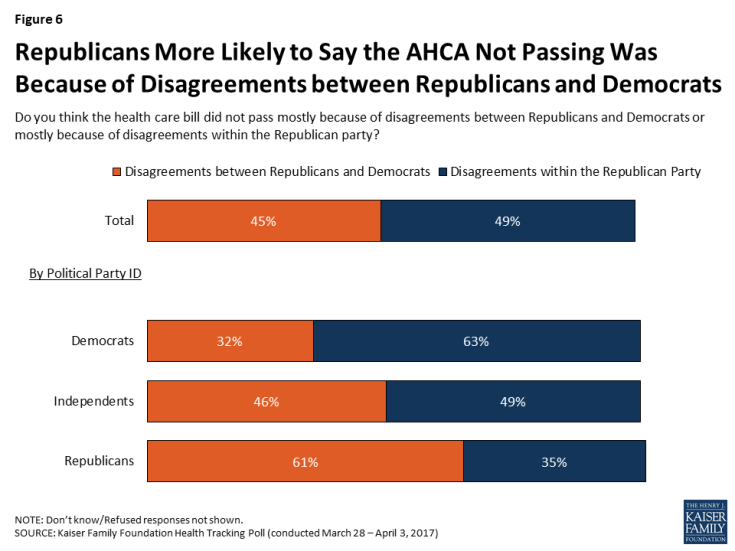
Figure 6: Republicans More Likely to Say the AHCA Not Passing Was Because of Disagreements between Republicans and Democrats
How the Public Views Republican Leadership On the AHCA
When asked specifically who is most to blame among Republicans in Congress for the AHCA not passing, the public is also divided. About three in ten say the conservative Freedom Caucus (27 percent) is most to blame, which is the same as the share who say House Speaker Paul Ryan (27 percent) is most to blame. A slightly smaller share (22 percent) say moderate Republican lawmakers are most to blame for Congress not passing the bill. These views do not vary substantially across parties.
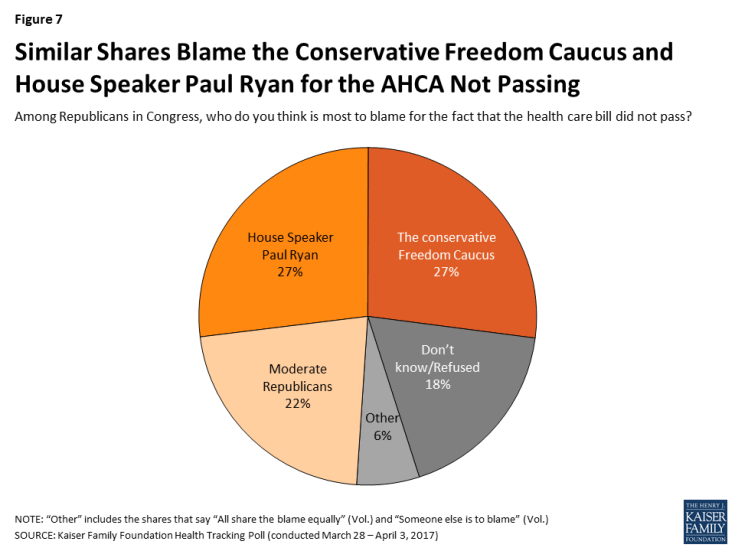
Figure 7: Similar Shares Blame the Conservative Freedom Caucus and House Speaker Paul Ryan for the AHCA Not Passing
Conservative Republicans are more likely to place blame on House Speaker Paul Ryan (30 percent) than moderate and liberal Republicans (19 percent). However, among all Republicans, a slightly larger share put the blame for the AHCA not passing on the conservative Freedom Caucus than on House Speaker Paul Ryan or moderate Republicans.
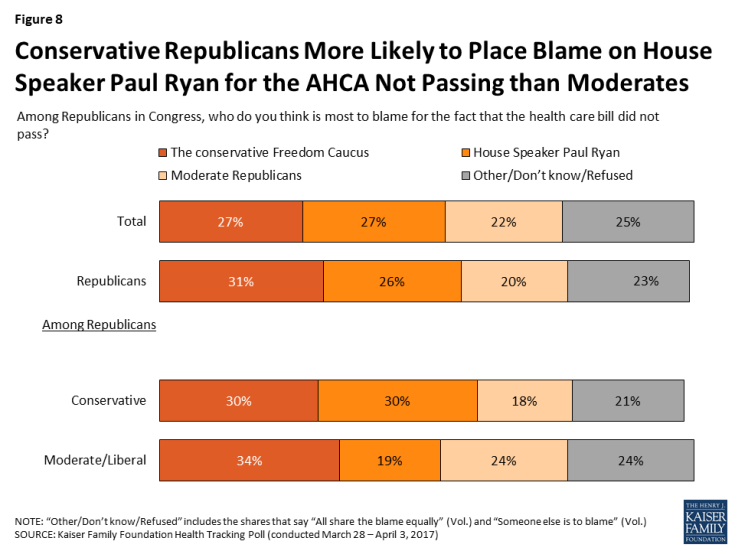
Figure 8: Conservative Republicans More Likely to Place Blame on House Speaker Paul Ryan for the AHCA Not Passing than Moderates
When asked how the failure of the AHCA reflects on Republican lawmakers, more of the public says it is a sign of bigger problems Republicans have governing than say the issue is unique to this bill and doesn’t say much about Republicans’ ability to govern (52 percent versus 39 percent). And, while more Democrats and independents see Congress not passing the AHCA as indicative of bigger problems Republicans have governing, Republicans themselves are less pessimistic. Six in ten (62 percent) Republicans say that Congress’ inability to pass the AHCA is unique to this specific bill and doesn’t say much about Republicans’ ability to act on other issues.
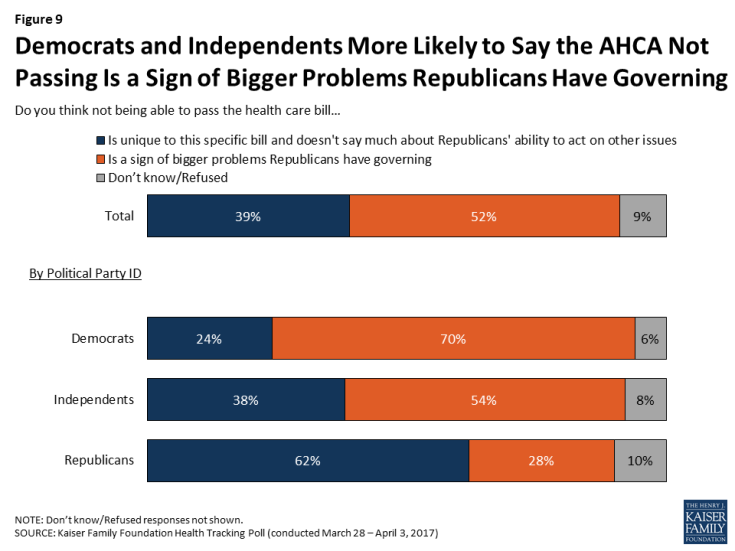
Figure 9: Democrats and Independents More Likely to Say the AHCA Not Passing Is a Sign of Bigger Problems Republicans Have Governing
Next Steps for the ACA
With Congress not passing the most recent attempt to repeal and replace the 2010 health care law, the public is divided in its view of the ACA with equal shares (46 percent) expressing a favorable view as an unfavorable view.
Despite the divided views towards the law, three-fourths of the public think President Trump and his administration should do what they can to make the current health care law work while one-fifth (19 percent) of Americans say President Trump and his administration should do what they can to make the ACA fail so they can replace it later.
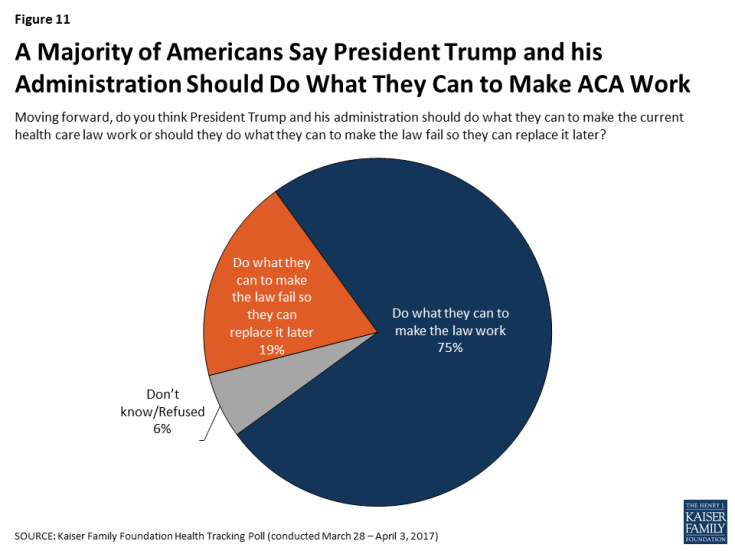
Figure 11: A Majority of Americans Say President Trump and his Administration Should Do What They Can to Make ACA Work
The vast majority of Democrats (89 percent), eight in ten independents (78 percent), and half of Republicans (51 percent) say President Trump and his administration should do what they can to make the law work. There are divides among Republicans, with a majority of moderate and liberal Republicans (60 percent) saying the administration should do what they can to make the law work, compared to 45 percent of conservative Republicans. Among Trump supporters, 54 percent think President Trump’s administration should do what they can to make the current health care law work while a smaller share (37 percent) say they should do what they can to make the law fail.
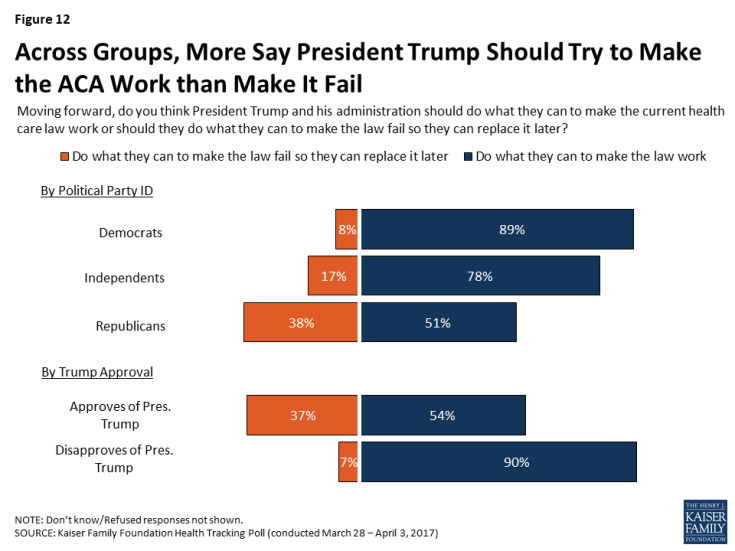
Figure 12: Across Groups, More Say President Trump Should Try to Make the ACA Work than Make It Fail
With the future of any other replacement plans uncertain, this month’s survey also gauges who the public views as responsible for the 2010 health care law going forward. A majority (61 percent) of the public say that because President Trump and Republicans in Congress are in control of the government, they are now responsible for any problems with the ACA moving forward. About three in ten Americans (31 percent) say that because President Obama and Democrats in Congress passed the law, they are responsible for any problems with it.
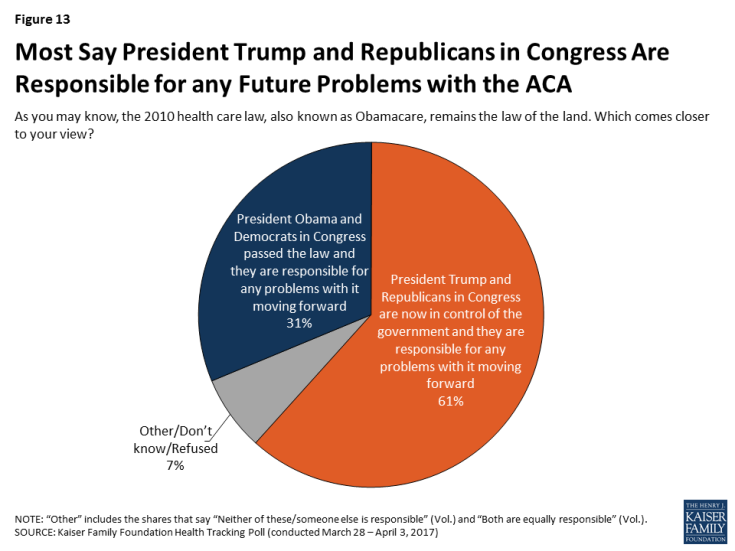
Figure 13: Most Say President Trump and Republicans in Congress Are Responsible for any Future Problems with the ACA
The Future of Health Reform
During his campaign, President Trump promised that under his administration, Americans will get better health care at a lower cost than they pay now. The December 2016 Kaiser Family Foundation Tracking Poll1 found that about half of the public thought President Trump would be able to deliver on this campaign promise. Three months later, this month’s survey finds a decrease in the share of the public who are confident that President Trump will be able to deliver on this promise (from 47 percent to 37 percent). The decrease in the share who are confident that President Trump will be able to deliver on this campaign promise is found among Democrats, independents, and Republicans; yet, a large majority of Republicans are still confident that he will be able to deliver.
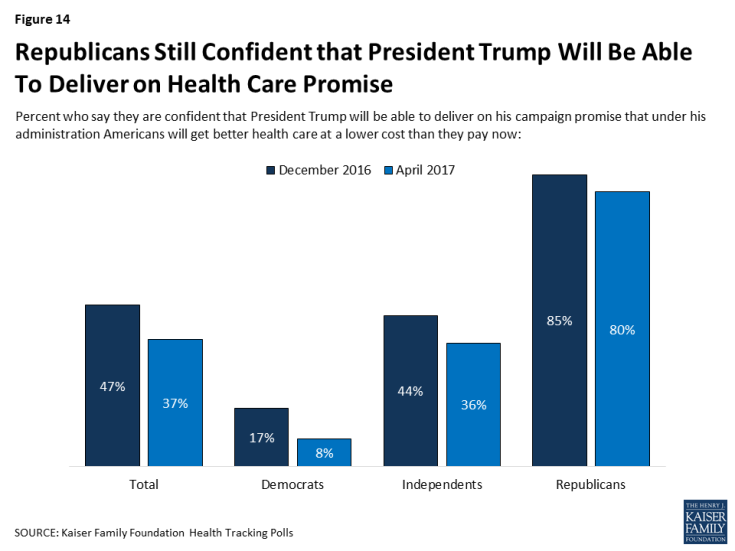
Figure 14: Republicans Still Confident that President Trump Will Be Able To Deliver on Health Care Promise
But there is no general consensus on what President Trump and Republicans in Congress should do next. About half of the public (49 percent) say President Trump and Republicans should stop working on health care and move on to other priorities while 45 percent of the public want them to keep working on a plan to repeal and replace the 2010 health care law. Partisanship underlies these views, with 75 percent of Republicans wanting President Trump and Republicans in Congress to keep working on a replacement plan, 70 percent of Democrats wanting them to move on to other priorities, and independents divided (48 percent wanting them to move on and 48 percent wanting them to keep working on a replacement plan).

